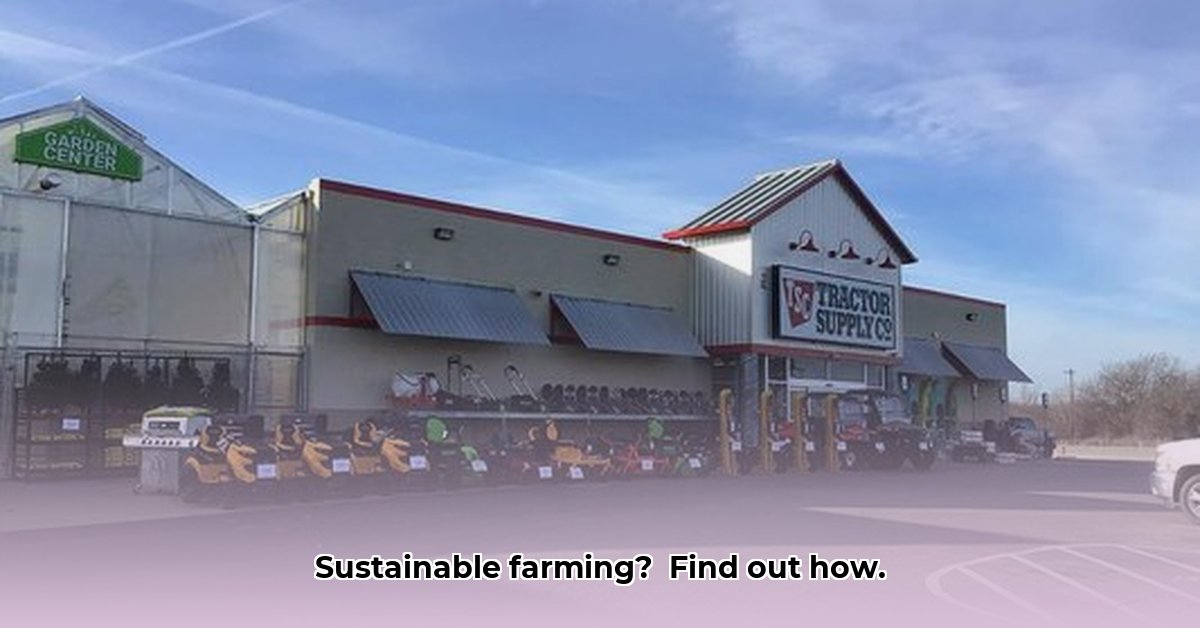
Tractor Supply Company (TSC) in Broken Arrow, Oklahoma, serves as a vital resource for local farmers, ranchers, and gardeners. Offering a wide range of products, from animal feed and equipment to gardening supplies, TSC's role in supporting sustainable agriculture warrants careful examination. While the store's extensive inventory includes items aligned with eco-friendly practices, a deeper dive reveals both successes and areas demanding improvement. How effectively does TSC contribute to sustainable farming in the Broken Arrow community? Let's explore. For more information on similar TSC locations, check out this example store.
TSC's Contributions to Sustainable Farming
TSC's positive impact on sustainable agriculture in Broken Arrow is evident in several key areas. The availability of locally sourced animal feed, for example, reduces transportation emissions and strengthens the local economy. Furthermore, water-conserving tools and equipment promote efficient resource management. Finally, fencing supplies support responsible animal husbandry, preventing overgrazing and protecting natural habitats. These offerings clearly demonstrate a commitment to at least some aspects of sustainability. But is this enough?
However, a significant challenge lies in TSC's lack of transparency regarding its overall environmental footprint. While the company mentions sustainability on its website, concrete data on sourcing practices, carbon emissions, and waste reduction are largely absent. This lack of readily available information hinders informed consumer choices and raises concerns about the extent of TSC's actual commitment. Isn't comprehensive transparency crucial for building trust, especially when consumers increasingly prioritize environmentally friendly products?
Navigating the Challenges: Balancing Sustainability and Market Demands
TSC faces the inherent challenge of catering to a diverse clientele. Balancing the demands of environmentally conscious customers with those seeking cost-effective options is undoubtedly complex. This broad market appeal, while essential for business viability, can inadvertently dilute the company's focus on sustainable initiatives. How can TSC effectively prioritize sustainability without alienating a significant portion of its customer base? This question demands careful consideration.
A Path Forward: Strategies for Enhanced Sustainability
To strengthen its commitment to sustainable agriculture, TSC must prioritize several key actions. A thorough assessment of its environmental impact, including carbon footprint, waste generation, and supply chain sustainability, is paramount. Transparency is crucial; publicly releasing this data fosters trust and accountability. Furthermore, investing in and promoting more environmentally friendly product lines is vital. This requires a proactive and ongoing commitment to sustainability beyond simply offering a few select eco-friendly items.
Local farmers and consumers can play a significant role. By actively supporting TSC's sustainable initiatives and providing feedback, they influence product selection and company strategy. Equally important are partnerships with environmental non-governmental organizations (NGOs), providing expert guidance and promoting best practices. These collaborations are crucial for long-term success in achieving meaningful sustainable growth.
Risk Assessment: Challenges on the Road to Sustainability
TSC faces several risks in its pursuit of greater sustainability:
- Supply Chain Disruptions: Maintaining a dependable, sustainable supply chain is critical yet susceptible to various disruptions. Mitigation strategies include diversifying suppliers and investing in resilient supply chain management.
- Changing Consumer Preferences: Adapting to shifting consumer demands requires continuous monitoring of trends and innovative product adaptation.
- Lack of Transparency: Addressing transparency concerns demands open communication and demonstrable commitment to data-driven reporting.
- Competitive Pressure: Standing out in a competitive market necessitates a strong sustainable brand identity through impactful and visible initiatives.
- Regulatory Changes: Proactive monitoring of evolving environmental regulations is essential to ensure complete compliance.
Actionable Steps for Improved Sustainability
To truly make a difference, TSC should take the following concrete actions:
Conduct a Comprehensive Environmental Audit: (Measure carbon footprint, waste, and supply chain impact.) — This will provide baseline data for informed decision-making.
Develop a Transparent Sustainability Report: (Publish data publicly, including sourcing details and reduction targets.) — Transparency builds trust and accountability.
Invest in Sustainable Product Development: (Expand lines of eco-friendly products, emphasizing local sourcing and responsible manufacturing.) — Demonstrate a tangible commitment to sustainability.
Engage with Local Farmers and Communities: (Establish feedback mechanisms to understand and address their needs.) — Collaboration ensures that initiatives align with real-world needs.
Partner with Environmental NGOs: (Leverage expertise and advocacy to enhance sustainability efforts.) — Utilize external knowledge to improve effectiveness.
By embracing these strategies, Tractor Supply Company can contribute meaningfully to a more environmentally responsible agricultural sector in Broken Arrow and beyond. The path is challenging, but the rewards – both environmental and economic – are substantial.